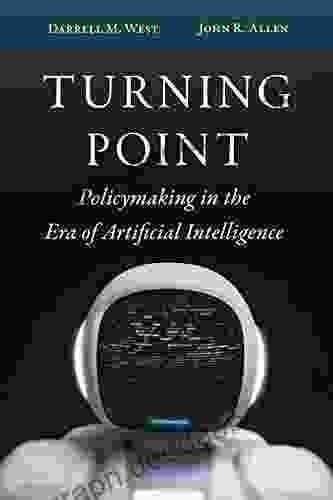Policymaking in the Era of Artificial Intelligence: Challenges, Opportunities, and Ethical Considerations

4.3 out of 5
| Language | : | English |
| File size | : | 6405 KB |
| Text-to-Speech | : | Enabled |
| Screen Reader | : | Supported |
| Enhanced typesetting | : | Enabled |
| X-Ray for textbooks | : | Enabled |
| Word Wise | : | Enabled |
| Print length | : | 301 pages |
| X-Ray | : | Enabled |
Artificial intelligence (AI) is rapidly transforming the world as we know it. From self-driving cars to facial recognition software, AI is already having a profound impact on our lives. As AI continues to develop, it is likely to play an increasingly significant role in policymaking. However, the use of AI in policymaking also raises a number of important challenges and ethical considerations.
Challenges of Policymaking in the Era of AI
One of the biggest challenges of policymaking in the era of AI is the lack of understanding about how AI works. AI systems are often complex and opaque, making it difficult to understand how they make decisions. This lack of understanding can make it difficult to assess the potential benefits and risks of AI, and to develop policies that govern its use.
Another challenge is the potential for AI to exacerbate existing inequalities. AI systems can be biased, reflecting the biases of the data they are trained on. This can lead to AI systems making unfair or discriminatory decisions. For example, an AI system used to predict recidivism rates may be biased against certain racial groups, leading to unfair sentencing outcomes.
Finally, there is the concern that AI could be used to manipulate people or to undermine democracy. AI systems can be used to spread misinformation or to create deepfakes, which are realistic fake videos that can be used to deceive people. This could have a profound impact on public discourse and the ability of citizens to make informed decisions.
Opportunities of Policymaking in the Era of AI
Despite the challenges, AI also presents a number of opportunities for policymakers. AI can be used to improve the efficiency and effectiveness of government services. For example, AI can be used to automate tasks, such as processing applications for benefits or providing customer service. AI can also be used to analyze data and identify trends, which can help policymakers make more informed decisions.
AI can also be used to improve the transparency and accountability of government. AI systems can be used to track government spending and activities, and to provide citizens with access to information about how their government is operating. This can help to increase public trust in government and to hold government officials accountable.
Finally, AI can be used to promote economic growth and innovation. AI can be used to develop new products and services, and to automate tasks that are currently done by humans. This can lead to increased productivity and economic growth. AI can also be used to improve the quality of life for citizens, by providing them with access to new technologies and services.
Ethical Considerations for Policymaking in the Era of AI
As policymakers consider how to use AI, it is important to be mindful of the ethical considerations involved. AI systems can have a profound impact on people's lives, and it is important to ensure that they are used in a fair, responsible, and transparent manner.
Some of the key ethical considerations for policymakers include:
- Transparency: Policymakers should ensure that the use of AI systems is transparent and accountable. Citizens should be able to understand how AI systems work and how they are used to make decisions.
- Fairness: Policymakers should ensure that AI systems are fair and unbiased. AI systems should not discriminate against any particular group of people.
- Accountability: Policymakers should ensure that there is a clear framework for accountability when AI systems are used to make decisions. It should be clear who is responsible for the decisions made by AI systems.
- Privacy: Policymakers should ensure that the use of AI systems respects people's privacy. AI systems should not collect or use personal data without people's consent.
Recommendations for Navigating the Complex Landscape of Policymaking in the Era of AI
Given the challenges and opportunities of policymaking in the era of AI, it is important for policymakers to develop a clear and comprehensive strategy for using AI. This strategy should include the following elements:
- Develop a clear understanding of AI: Policymakers should invest in research and education to develop a clear understanding of how AI works. This will help policymakers to make informed decisions about how to use AI and to mitigate the potential risks.
- Identify and mitigate the risks of AI: Policymakers should identify and mitigate the risks of AI, such as the potential for bias, discrimination, and manipulation. This may involve developing new regulations or guidelines for the use of AI.
- Promote the benefits of AI: Policymakers should promote the benefits of AI, such as the potential for improved efficiency, transparency, and accountability. This may involve investing in AI research and development, or developing programs to help businesses and organizations adopt AI.
- Engage with stakeholders: Policymakers should engage with stakeholders, such as businesses, researchers, and civil society organizations, to develop a shared understanding of the challenges and opportunities of AI. This will help to ensure that AI is used in a way that benefits society as a whole.
Artificial intelligence is a powerful technology that has the potential to transform the world for the better. However, it is important to be mindful of the challenges and ethical considerations involved in using AI. By developing a clear and comprehensive strategy for using AI, policymakers can harness the power of this technology to create a more just, equitable, and prosperous society.
4.3 out of 5
| Language | : | English |
| File size | : | 6405 KB |
| Text-to-Speech | : | Enabled |
| Screen Reader | : | Supported |
| Enhanced typesetting | : | Enabled |
| X-Ray for textbooks | : | Enabled |
| Word Wise | : | Enabled |
| Print length | : | 301 pages |
| X-Ray | : | Enabled |
Do you want to contribute by writing guest posts on this blog?
Please contact us and send us a resume of previous articles that you have written.
 Book
Book Reader
Reader E-book
E-book Magazine
Magazine Newspaper
Newspaper Paragraph
Paragraph Bookmark
Bookmark Shelf
Shelf Glossary
Glossary Foreword
Foreword Preface
Preface Synopsis
Synopsis Annotation
Annotation Footnote
Footnote Manuscript
Manuscript Scroll
Scroll Tome
Tome Narrative
Narrative Memoir
Memoir Reference
Reference Dictionary
Dictionary Thesaurus
Thesaurus Narrator
Narrator Character
Character Resolution
Resolution Catalog
Catalog Card Catalog
Card Catalog Borrowing
Borrowing Archives
Archives Study
Study Research
Research Scholarly
Scholarly Lending
Lending Journals
Journals Rare Books
Rare Books Study Group
Study Group Thesis
Thesis Dissertation
Dissertation Storytelling
Storytelling Theory
Theory Rebecca Ferguson
Rebecca Ferguson Diane Romo
Diane Romo Kelly Dipucchio
Kelly Dipucchio Margriet Ruurs
Margriet Ruurs Virginia Lee Burton
Virginia Lee Burton Faith Isabel Bloom
Faith Isabel Bloom Christine Haynes
Christine Haynes Lacy Williams
Lacy Williams Stephen J Phillips
Stephen J Phillips Mike Morgan
Mike Morgan Ardi Aaziznia
Ardi Aaziznia Marco D Eramo
Marco D Eramo Bob Heyman
Bob Heyman Jen Malone
Jen Malone Wesley G Skogan
Wesley G Skogan Antony Wootten
Antony Wootten Mareike Schomerus
Mareike Schomerus Gary Alan Fine
Gary Alan Fine Kenney Jones
Kenney Jones Lia Celi
Lia Celi
Light bulbAdvertise smarter! Our strategic ad space ensures maximum exposure. Reserve your spot today!

 Denzel HayesElvis and the Tropical Double Trouble Southern Cousins Mystery: Unraveling...
Denzel HayesElvis and the Tropical Double Trouble Southern Cousins Mystery: Unraveling...
 Miguel NelsonDivided Politics, Divided Nation: The Impact of Political Polarization on...
Miguel NelsonDivided Politics, Divided Nation: The Impact of Political Polarization on...
 Reed MitchellBefore Home Found Us: A Heartbreaking Saga of Family, Loss, and Finding One's...
Reed MitchellBefore Home Found Us: A Heartbreaking Saga of Family, Loss, and Finding One's... Cody RussellFollow ·5.9k
Cody RussellFollow ·5.9k Ben HayesFollow ·9.1k
Ben HayesFollow ·9.1k Rodney ParkerFollow ·5.8k
Rodney ParkerFollow ·5.8k Jorge Luis BorgesFollow ·5k
Jorge Luis BorgesFollow ·5k Willie BlairFollow ·19.2k
Willie BlairFollow ·19.2k Ivan CoxFollow ·6.1k
Ivan CoxFollow ·6.1k Colin FosterFollow ·5.9k
Colin FosterFollow ·5.9k Ed CooperFollow ·11k
Ed CooperFollow ·11k

 Ricky Bell
Ricky BellThe Marriage: An Absolutely Jaw-Dropping Psychological...
In the realm of...

 Ray Blair
Ray BlairDiscover the Enchanting Charm of Budapest and Its...
Nestled in the heart of...

 Tyrone Powell
Tyrone PowellHuddle: How Women Unlock Their Collective Power
Huddle is a global movement that empowers...

 Grayson Bell
Grayson BellThe Coin Story of the Holocaust: A Symbol of Hope and...
In the depths of the...

 Virginia Woolf
Virginia WoolfFolklore Performance and Identity in Cuzco, Peru: A...
Nestled amidst...

 Dylan Mitchell
Dylan MitchellThe Enduring Love Story of Héloïse and Abélard: A Tale of...
An Intellectual Passion In the heart of...
4.3 out of 5
| Language | : | English |
| File size | : | 6405 KB |
| Text-to-Speech | : | Enabled |
| Screen Reader | : | Supported |
| Enhanced typesetting | : | Enabled |
| X-Ray for textbooks | : | Enabled |
| Word Wise | : | Enabled |
| Print length | : | 301 pages |
| X-Ray | : | Enabled |





